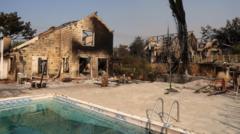Ion Iliescu, a key figure in Romania's shift to democracy, has died at 95. His career includes both essential contributions to the nation's integration into NATO and the EU, as well as a legacy marked by political violence and corruption. He remains a controversial figure, embodying the complexities of a tumultuous era.
Remembering Ion Iliescu: The Complex Legacy of Romania's First Democratic Leader

Remembering Ion Iliescu: The Complex Legacy of Romania's First Democratic Leader
Ion Iliescu, Romania's first democratic leader who played a pivotal role in the country's transition from communism, has passed away at 95, leaving behind a mixed legacy of progress and controversy.
Ion Iliescu, whose name is emblematic of Romania's challenging journey towards democracy, has died at the age of 95. Iliescu, who played a crucial role in the country's transition from communist rule to a more democratic framework, is remembered both as a source of hope and as a polarizing figure in Romanian politics.
His passing on August 5 signifies the close of a remarkable life that was deeply interwoven with Romania's most pivotal historical events. "To understand Iliescu, you must grasp the complexity of Romania's 1990s," insights political analyst Teodor Tita. "He was neither a straightforward hero nor a clear-cut villain; he personified the contradictions of a nation striving to reshape itself while grappling with its past."
Iliescu first came to prominence during the chaotic December 1989 revolution, which signaled the abrupt end of Nicolae Ceausescu's long and oppressive regime. Initially heralded as a leader who would usher Romania into a fresh democratic future, his legacy quickly grew more complicated. His leadership navigated the nebulous early years of democracy, guiding the country towards its membership in NATO and the European Union, achievements credited to his steady approach.
However, Iliescu's time in office was not without its controversies. Political analyst Teodor Tita remarks, "His presidency was also marked by events that continue to haunt Romania's collective memory — from suppressing protests in 1990 to the violent Mineriads and his hesitance to completely sever ties with the remnants of the communist system." These matters cast a long shadow over his time in power.
Iliescu was born on March 3, 1930, in Oltenita, Romania. His journey began in Moscow, where he studied engineering during the Stalin era, becoming involved in political circles that would later fuel speculation about his connections to influential communist leaders such as Mikhail Gorbachev. After returning to Romania, he quickly ascended within the Communist Party before being marginalized due to his reformist aspirations.
When the revolution erupted in 1989, Iliescu emerged as a leader of the National Salvation Front (FSN), which formed during the unrest. As interim president, he oversaw the dismantling of Ceausescu's regime. His election victory in 1990 marked Romania's first democratic vote in over five decades, where he secured an impressive 85% of the ballots. However, his triumph was shadowed by disinformation and state-sanctioned propaganda aimed at discrediting liberal opponents.
His presidency faced rising protests, especially from students who demanded political reform. Iliescu’s infamous appeal for miners to "restore order" resulted in the brutal Mineriads, characterized by severe violence against protestors, in which many were injured and lives were lost.
Serving a second full term after winning the 1992 elections, Iliescu held the presidency again from 2000 to 2004. The tumultuous years post-revolution were marred by enduring corruption, with critics arguing his reluctance to address the past allowed a culture of impunity to flourish. Today, many associate the challenges of contemporary Romania, including endemic corruption and economic struggles, with his administration's legacy.
Despite the controversies, Iliescu's later years saw significant progress regarding Romania's Western integration, culminating in NATO membership and closing European Union accession talks. He oversaw market reforms and the adoption of the first democratic constitution, which still governs Romanian society today.
Still, Iliescu's legacy remained marred by unresolved questions surrounding his involvement in violence during the early 1990s, leading to a formal indictment for crimes against humanity in 2017—though legal actions continued for years without resolution.
In his later years, Iliescu stepped back from public life while maintaining a presence in the Social Democratic Party as its honorary president. He occasionally shared political reflections on his personal blog, with his last post in May 2025 congratulating President Nicusor Dan on a recent electoral victory.
As Teodor Tita aptly summarizes, Iliescu played a pivotal role in constructing Romania's democracy, yet he was also "a relentless politician, unafraid to incite violence in his pursuit of power."



















